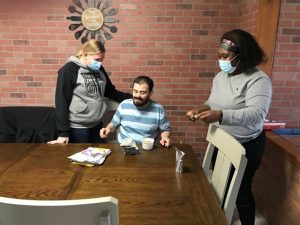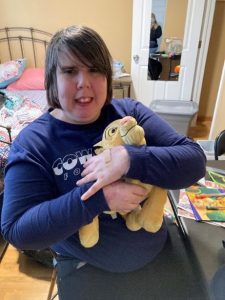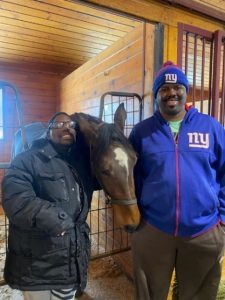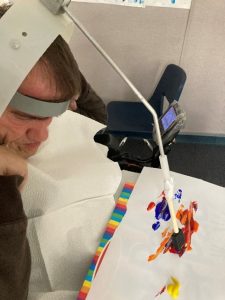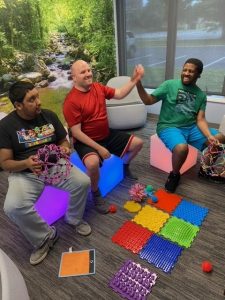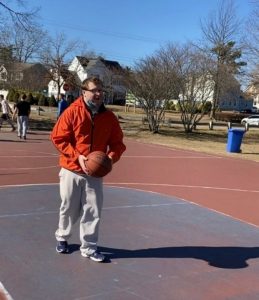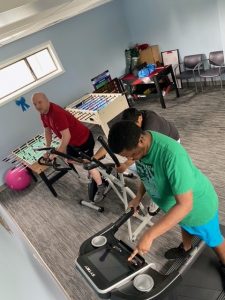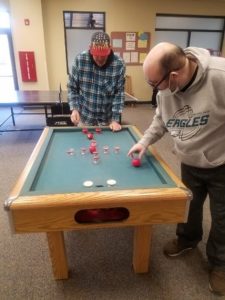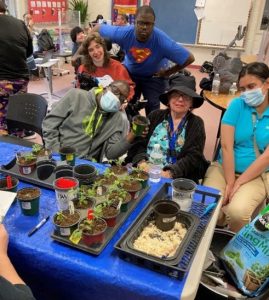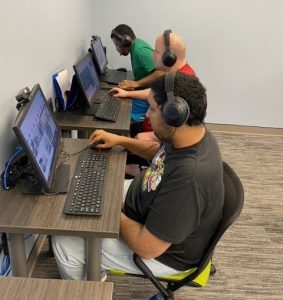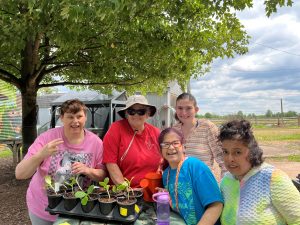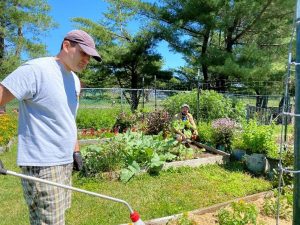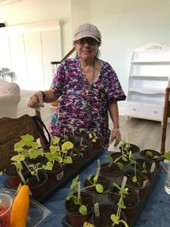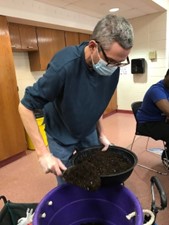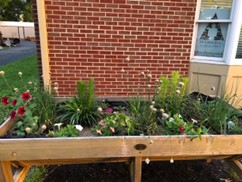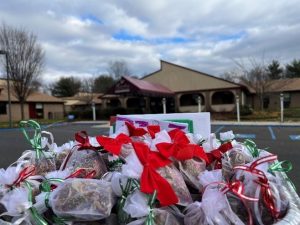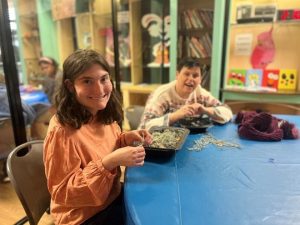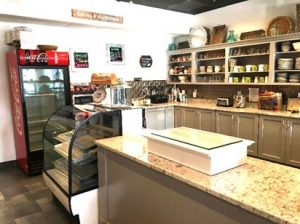Allies Residential Services
Allies Residential Services provide a variety of housing support options for individuals with intellectual and developmental disabilities (IDD) and special needs. Our overarching goal is to help support a safe and healthy place for individuals to live and thrive; and help them integrate into their local communities.
We currently provide residential services to 350 people throughout 19 counties in New Jersey. Support is offered in four different types of settings: Group Homes, Medical Groups Homes with 24-hour nursing care, Supervised Apartments, and within an individual’s private home.
Homes and Care That Support Your Unique Needs
The home setting and the type of care that is provided is self-directed and based on each person’s preferences and unique needs. One family may need services to support their son or daughter living in their family home, while another individual may choose to move out on their own and need some assistance with daily living activities.
Allies’ homes are warm and inviting and can be found in cities and towns throughout New Jersey. Nothing differentiates them from other homes in the neighborhood; except that they may have an Allies staff member inside to provide support to its residents.
Compassionate Care, Trained Staff
At Allies we pride ourselves on offering support that is compassionate; and allows those we serve to live as independently as possible, with respect and dignity. We honor their choices and goals and encourage residents to become active members of their community. This may be taking them to an event that they volunteered for, driving them to a religious service they’d like to attend, or accompanying them as they enjoy a local park, recreational center, or concert.
Each staff member that works in our homes, or provides in-home support, receives thorough hands-on training in the areas of First Aid, CPR, use of an automated external defibrillator (AED), medication administration, crisis management, general behavioral education, and reporting and monitoring. Staff must also complete a series of online courses through the College of Direct Support and Relias Learning Management Software. Additionally, all staff receive specialized training that is unique to the needs of the individuals living in the home. Coursework may include topics such as: Autism Spectrum Disorders, Cerebral Palsy, Positive Behavior Support, Teaching People with Developmental Disabilities, Special Dietary Needs, Seizure Disorders, Diabetes, and much more.
For more information on how Allies residential services can support you or a loved one, please call Trisha Burns, Senior Director of New Development, at 609-689-0136 x 4282 or email tburns@alliesnj.org.
Day Habilitation
Allies offers day habilitation services in seven locations throughout the state of New Jersey. Our programs provide the opportunity for participants to engage in a variety of person-centered community and site-based activities that are matched to fit the abilities, interests, and support needs of each attendee. Transportation is provided to and from our day program centers.
Day program locations include:
- Flemington Day Program in Flemington, NJ
- Green Brook Day Program in Green Brook, NJ
- Mercer Day Program in Hamilton, NJ
- Holly Day Program in Mt. Holly, NJ
- Salem Day Program in Mannington, NJ
- Shore Day Program in Barnegat, NJ
- Wall Day Program in Wall Township, NJ
To register for one of our Day Habilitation programs visit: https://hipaa.jotform.com/211675149121148…
Our programs’ goals are to:
- Increase participants’ independence in all activities of daily living through staff support; development of critical life skills; and meaningful social and instructional activities personalized to their preferences, skill level, and goals.
- Promote and help maintain the physical, mental, and emotional health and well-being of program participants.
- Engage participants in community activities to develop their peer and organizational relationships, encourage leisure interests, and promote community integration.
Goals are achieved through the following:
Community engagement:
- Participants are encouraged to become active members of their community, take part in local events, and volunteer to help others.
- The program coordinates a variety of cultural, outdoor, and recreational trips that bring enrichment and excitement to participants’ lives. Trips include venues such as baseball and amusement parks, concerts, aquariums, the boardwalk, and local parks and trails.
- Participants are encouraged to try different leisure activities such as painting, arts and crafts, or bowling; and exercise personal choice in the selection of new hobbies to pursue.
Health and wellness initiatives:
- The Salem Day Program features a “Health and Wellness” room with a treadmill, stationary bike, elliptical machine, yoga mats, and fitness balls.
- Participants at all day program sites engage in fitness activities such as stretching, controlled breathing, light walking, yoga, and beach ball tosses.
- Individuals’ participation in community fitness activities at local parks and recreational centers is strongly encouraged and supported.
- Clinical supports (behavioral and medical) are provided to participants as outlined in their service plans.
Skill development:
- Problem-solving skills: Small group instruction with hands-on activities promote independence in analyzing and making educated decisions. Instruction includes science lessons, experiments, and scavenger hunts.
- Social skills/communication strategies: Social development skills are built through activities such as indoor and outdoor games, karaoke, and trips to local parks, farmers markets and outdoor festivals. Peer socialization is encouraged to reinforce effective communication strategies and self-expression.
- Adaptive Skills: Small group activities foster positive peer interaction and the opportunity to build relationships and strengthen interpersonal development skills, practice self-direction, and understand social cues. Activities include tabletop games, arts and crafts, and a computer lab.
Daily living instruction:
- Hands-on learning opportunities for proper self-care and hygiene, including instruction in cleaning techniques.
- Personal safety instruction and practices that are woven through all program site-based activities and community-based outings.
- Functional academics instruction including money handling skills, technology awareness and safety, meal preparation, and etiquette. Instruction combines social skills training, by having lunch at a local restaurant or shopping mall.
Our day program services continuously grow and evolve to meet the needs of our community. We encourage you to contact us for an in-depth overview of our offerings.
For more information, please contact Beth Lopez, V.P. of Vocational Services, at bcarey@alliesnj.org or 609-689-0136 x 5740.
Project Grow Horticultural Therapy Program
A highlight of our day habilitation programs is our much-loved horticultural therapy program – Project Grow. Project Grow participants receive an education in the many benefits that gardening can provide, such as increasing health and wellness, supplying your own food, and stress reduction through the enjoyment of nature and being outdoors.
Project Grow’s gardens are located throughout New Jersey at Mercer County Community College (MCCC) in West Windsor and Duke Farms Community Garden in Hillsborough. We also have accessible raised garden beds outside Allies Day Programs including Mercer Day Program in Hamilton, Flemington Day Program in Flemington, and Mt. Holly Day Program in Mt. Holly. These raised beds allow individuals of various abilities, including those using wheelchairs, to participate in the program and experience the joys of gardening. Zoom sessions expand the reach of the program even wider, allowing those who cannot physically visit the gardens to participate in the comfort of their own home.
In addition to providing therapy and education through horticulture, Project Grow aims to give back to local communities. Each year we donate our harvests to food banks, such as the Mercer Street Friends Food Bank in Ewing Township. In 2022 we donated 1,500 pounds of fresh vegetables, herbs, and flowers to food banks in need. Over the winter, Project Grow participants use a mix of flowers, lavender and lemon balm grown in our gardens to make potpourri gift items for assisted living and nursing homes. Gardening and giving back go hand-in-hand with Project Grow.

Allies would like to thank Mercer County Community College and Duke Farms Community Garden for their support of Project Grow, and express sincere appreciation to Bristol Myers Squibb, Janssen and the National Garden Bureau for their grants that help make the program possible.
For more information about Project Grow, or to sponsor the program, please contact Beth Lopez, V.P. of Vocational Services, at bcarey@alliesnj.org or 609-689-0136 x 5740.
Vocational Services
Since 2000, Allies’ Vocational Services have supported individuals with intellectual and developmental disabilities (IDD) in finding innovative ways to secure meaningful employment opportunities and become proud members of the workforce. Our Vocational Services include:
- Individualized Supported Employment (NJ and DE)
- Small Group Supported Employment (NJ and DE)
- Transition Services (NJ and DE)
- Pre-vocational Services featuring our Bake Studio Training Program (NJ)
Individualized Supported Employment Services
Allies offers Individualized Supported Employment Services for people with IDD who are seeking support in obtaining and maintaining competitive or customized employment, as well as self-employment. Services are tailored to the unique needs of each job seeker, and may include Pre-Placement and Job Development, Job Coaching, Long-Term Follow Along Support, and Travel Training.
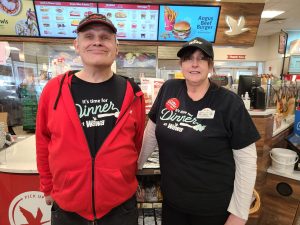
Rein Kukk (on left), a Wawa customer service associate, and Carol Healy, General Manager at Wawa.
Rein has been thriving in his job at Wawa for over 15 years.
Pre-placement and Job Development
- Creation of a vocational profile for each individual to determine their personal skills, interests, abilities, availability, work experience, and employment prospects
- Assessments to identify appropriate job placements
- Job development including support with the job search and the application and interview process
- Assistance with improving job seeking skills
- Job site analysis to ensure that the employer/company is a good fit for each individual
- Addressing concerns and providing solutions to barriers and retention
- Relationship-building with community stakeholders and local businesses to create opportunities for networking
Job Coaching
- Assistance with orientation and new hire activities
- On-site job coaching
- Direct training on job duties and tasks
- Development of strategies to support an individual in being a success in their new job, including walking an individual through the steps of each task so they can complete it independently, adaptations to support individuals’ needs, and the establishment of beneficial connections and support from colleagues
- Travel training to educate individuals on how to get to and from work
- Support in helping an employee communicate effectively with their employer
Long Term Follow Along Support and Job Coaching
- Support with job stabilization to aid individuals in maintaining satisfactory job performance
- Addressing changes to job duties and tasks
- Guidance in meeting standards of a new supervisor
- Exploration of new career opportunities and ways to grow
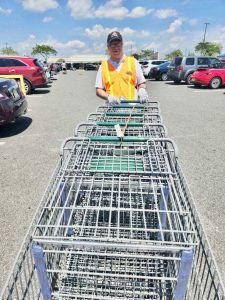
Dan Nilson is supported by an Employment Specialist at his job at ShopRite in Manahawkin, NJ.
Allies Small Group Supported Employment Services
Allies’ dynamic Small Group Supported Employment program, the Maintenance Crew Training Program (MCTP), presents a true pathway to employment for people with IDD. MCTP’s curriculum applies evidence-based practices that prepare individuals for the workplace, targets growth areas, and teaches skills needed for long-term job retention and success in the modern-day workforce.
Participants in MCTP learn various skills in indoor and outdoor sanitization, as well as gardening and landscaping, and are paid as they train and while they work. Individuals receive pre-vocational classes, on-going workplace assessments, task mastery, and transportation to and from the program as well. At the end of the one-year program, Allies assists participants in finding permanent employment opportunities, supported by a blend of our individualized supported employment services.
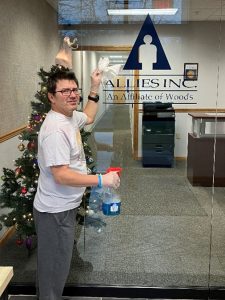 Kurt Rosengarth, a participant in the Maintenance Crew Training Program, enjoys learning
Kurt Rosengarth, a participant in the Maintenance Crew Training Program, enjoys learning
new work skills and is enthusiastic about setting new goals for himself.
Transition Services
Individuals aged 14-21 can receive Transition Supported Employment and Pre-Employment Services. These services prepare students and young adults with disabilities to move from school to post-school life. Allies connects with local school districts to provide customizable and person-centered services that can open doorways to employment opportunities and a bright future.
For more information about our Individualized Supported Employment, Small Group Supported Employment, and Transition Services contact Beth Lopez, Vice President of Vocational Services, at bcarey@alliesnj.org or 609-689-0136, x5740.
Pre-vocational Services
Allies’ offers pre-vocational services through their unique Bake Studio Training Program located in Greenbrook, NJ. Under the auspices of a trained instructor, participants receive education that is focused on the food industry. The program takes place in a fully functional culinary space and store front, complete with commercial equipment and industry standard supplies. This creates a seamless transition from pre-vocational training, to a community-based, competitive work environment.
Training opportunities are focused on the food industry and include training on how to work as a host, greeter, busser, server, in shipping and receiving, as well as working at the counter or managing a cash register.
In addition to the advantage of learning in a true business environment, participants learn through an exploratory training model, which applies a curriculum consisting of oral, written and video lesson plans supported by hands-on, practical training. Upon successful completion of the program, participants receive a certificate of completion and a letter of recommendation.
Prevocational soft skills:
- Resume creation and the job application process
- Interview skills
- Workplace social skills
- The value of teamwork
- Work ethics
Transferrable Job Skills
- Food prep and safety skills
- Culinary skills, including bakery art
- Register skills
- Retail merchandising
- Money handling
- Customer service
- Marketing
- Dishwashing
- Stocking
For more information about the Bake Studio Training Program, please contact Joe Gleason, Director of Vocational Services, Northern Region, at jgleason@alliesnj.org or at 609-414-6664.
Medical and Nursing
Protecting and promoting individuals’ health and wellness is a cornerstone of what we do at Allies. A foundation of good health is deeply connected to living a more enriched and purposeful life. It creates more opportunities to pursue meaningful employment, be more independent at home, partake in recreational activities, and socialize with friends, family, and the community.
Allies offers a variety of medical and nursing support to individuals with intellectual and developmental disabilities (IDD) in our residential programs, as well as in our seven day habilitation programs. We are also strong advocates for those in our care, ensuring that each individual has access to integrated medical care that supports their unique needs. Our exceptional nursing staff support each individual by navigating the healthcare system to ensure that all primary and specialty care needs are fully met. Staff place a strong emphasis on protecting the rights of each individual, promoting their independence and dignity, and ensuring their safety.
Residential Program Medical and Nursing Support:
- Assistance with activities of daily living and hygiene
- Coordination of trips to visit medical providers and obtain bloodwork or diagnostic tests
- Companionship
- Facilitation of emergency care if needed
- First aid administration
- Meal preparation and assistance with eating including specially designed diets
- Medication management and administration of medication and injections
- Support with breathing devices such as Continuous Positive Airway Pressure (CPAP) machines, nebulizers, and oxygen tanks
- Medical management of complex neurological diagnoses such as epilepsy and seizures
- Health education by nursing staff to support each individual in achieving their personal health and wellness goals
- Staff at the homes are certified in CPR, as well as trained in the use of Automated External Defibrillators (AED), a device that analyzes the heart’s rhythm, and if necessary, helps re-establish an effective rhythm.
Advanced Medical & Nursing Support
For those requiring more advanced daily medical care and attention, Allies offers nine medical group homes that provide holistic, customized medical care. Staff in our medical group homes are highly skilled and trained in medical and behavioral crisis management. Program staff and nurses work together in these homes to promote person-centered, collaborative care that is geared towards meeting the unique physical, emotional, and social needs of each resident.
With better access to coordinated, integrated medical care and support services, individuals with IDD have improved health outcomes and experience less emergency room visits and hospitalizations. In addition, by remaining in a natural, home-like environment, rather than being admitted to a hospital or other facility, individuals thrive. They are surrounded by the comforts of home, familiar faces, and the care and support of those around them. The result of specialized medical care, a home-like environment, and compassionate staff is that individuals have the opportunity to stay healthier, live longer, and age in place.
Medical Group Home Support:
Licensed Practical Nurses provide care in our Medical Group Homes, with oversight from Registered Nurses. Staff at the homes are certified in CPR, as well as trained in the use of Automated External Defibrillators (AED), and each medical home features an AED.
In addition to the care listed above, care at medical group homes also includes:
- Facilitation of doctor appointments and follow-up
- Ostomy care
- Seizure disorder care
- Tracheostomy care
- Tube feedings
- Urinary catheter care
- Wound care
Day Program Medical and Nursing Support:
All of Allies’ day habilitation programs are staffed with a nurse to provide the medical care listed above. Like our residential programs, we aim to ensure that our day program participants receive the medical care and attention that they need to be remain safe and in good health.
To learn more about Allies’ medical and nursing support, please contact Dawn King, Vice President of Integrated Health Services, at dking@alliesnj.org or call 609-689-0136 x 4712.
Behavioral Support Services
Approximately 40 percent of individuals who have a diagnosis of an intellectual or developmental disability (IDD) also have a mental illness and/or behavioral challenges. Allies’ team of Behavior Specialists work with these individuals to provide interventions that transform challenging behavior into constructive and adaptive behaviors that improve the quality of their lives. This support helps them to flourish and succeed in their community, at home and in their jobs, and achieve greater independence.
Assessment
As a first step in providing care to an individual, our team of Behavior Specialists conduct a Functional Behavior Assessment. This helps our team to understand the motivation for their maladaptive behaviors – behaviors that are not appropriate to the environment or a situation. The evaluation also determines their current level of independence, their potential for growth, and any barriers they may have in achieving growth.
Behavior Support Plans
Once the assessment is completed, a Behavior Support Plan (BSP) is created to support the individual. This individualized plan outlines the motivation for maladaptive behaviors and provides strategies to develop replacement behaviors and actions that will reinforce the replacement behaviors.
The person-centered BSPs are developed using the scientific theory of Applied Behavioral Analysis (ABA). This analysis focuses on how behaviors change, or are affected by the environment, as well as how learning takes place. Each individual’s BSP is unique and based on their particular behavior, personality, and goals.
Putting Behavior Support Plans into Action
Our team of Behavior Specialists review the BSPs with staff in each group home or day program, to ensure they understand an individual’s maladaptive behavior and how they can best support the individual throughout the day. The Behavior Specialists monitor the progress of each individual’s plan and make adjustments as needed.
Positive Progress Through Various Therapeutic Modalities
Self-regulation techniques
Many of our individuals have challenges with self-regulation. Self-regulation is how a person manages their feelings and emotions so that they can be brought back to a neutral place. Once they return to a neutral place, they are calmer and can refocus attention on tasks at hand.
Our behavioral team’s goal is to assist individuals with self-regulation, help them develop appropriate and adaptive coping skills, and support them in regulating any maladaptive behaviors.
The type of self-regulation technique that will soothe or calm an individual can vary and are based on their unique needs and personality. Some techniques utilized may include:
- Listening to music
- Movement therapy such as dancing, exercising, walking, stretching
- Utilization of sensory items, such as stress balls, rocking chairs, putty, exercise balls, and other gadgets that support focus and calm
- Enjoying time in nature
- Grounding techniques that keep individuals present and help them re-orient to the here-and-now, such as visualization or focusing on the five senses
By utilizing some of these sensory integration techniques above, adults with IDD experience a reduction in maladaptive behaviors and increased social and community participation.
Schedules to promote calmness and consistency
Another tool used to support positive behaviors are hourly and weekly schedules. Schedules provide consistency and predictability, which are major components in regulating maladaptive behaviors. Schedules produce positive outcomes for both verbal and non-verbal individuals. When individuals know what comes next in the timeline of their day, it often decreases anxiety and creates a sense of calm. A schedule also provides a framework by which the individuals can work from. This allows them to be more attentive and receptive to the integration of new adaptive and positive behaviors as well as coping skills.
Active Engagement
Another technique that helps build positive behaviors, skills, as well as increased self-esteem and self-efficiency is “active engagement.” Active engagement is ensuring that an individual is intentionally committed to doing things on their own, rather than having staff do things for them.
Our Behavior Specialists model what it means to be actively engaged to our staff, who then promote active engagement as they work with each individual in their home as well as in their local communities. Staff may support individuals with things such as cleaning their dishes, doing their laundry, making purchases while out shopping, or helping them order from a menu while at a restaurant. As they teach these skills, they encourage the individual to actively participate with them. As individuals practice performing these activities for themselves, they build self-confidence, develop new skills and begin to function with less support and greater independence.
Development of Social and Communication Skills
Our Behavioral Support Team also supports the development of healthy social and communication skills. Individuals learn to connect with peers and staff effectively and appropriately, as well as people outside of their home. This aids individuals in positively communicating their thoughts and feelings, building personal relationships, supporting interactions in the workplace, and integrating successfully into their community.
Positive Reinforcement
We believe that positive change in behavior occurs through positive reinforcement. Positive reinforcement is given to individuals on a consistent basis as they implement changed behaviors. This reinforcement increases their motivation to continue positive behaviors in the future. As changing maladaptive behaviors takes time, our behavioral team works with individuals regularly to help them shape new behavior, encourage positive coping strategies, and make strides towards the goals in their Behavioral Support Plan. In addition, our Behavioral Support Team provides consultation and training to our program management staff to ensure that the model of positive reinforcement and active engagement are reflected in all of their interactions with those we serve.
Enhancing the Quality of Care Through Advanced Staff Training
Allies believes that in order to provide the best support to individuals with IDD we must invest in the education of our direct support professionals and program management staff. Throughout the year we offer a dynamic, six-week Behavior Support Training Program that provides staff with the skills needed to effectively work with individuals with IDD; and help those they care for decrease maladaptive behaviors and reinforce positive behavior and changes.
The program covers topics such as: an overview of mental health diagnosis and guidelines on how to manage people with the diagnosis, including the role of medication; the effects of trauma and trauma-informed care; Applied Behavior Analysis; crisis intervention and prevention techniques; sensory diet; the importance of active engagement; and developing daily schedules.
Our knowledgeable and caring staff are committed to supporting the “whole” person. Their physical and mental health, their behaviors and challenges, recreation and employment, and the personal goals they want to achieve. We look forward to helping your loved one reach their fullest potential and greatest independence.
To learn more about Allies’ Behavioral Support Services, please contact Dr. Christine Walker, Director of Behavioral Health Services, at cwilliams0@alliesnj.org or call 609-689-0136 x 3099.

